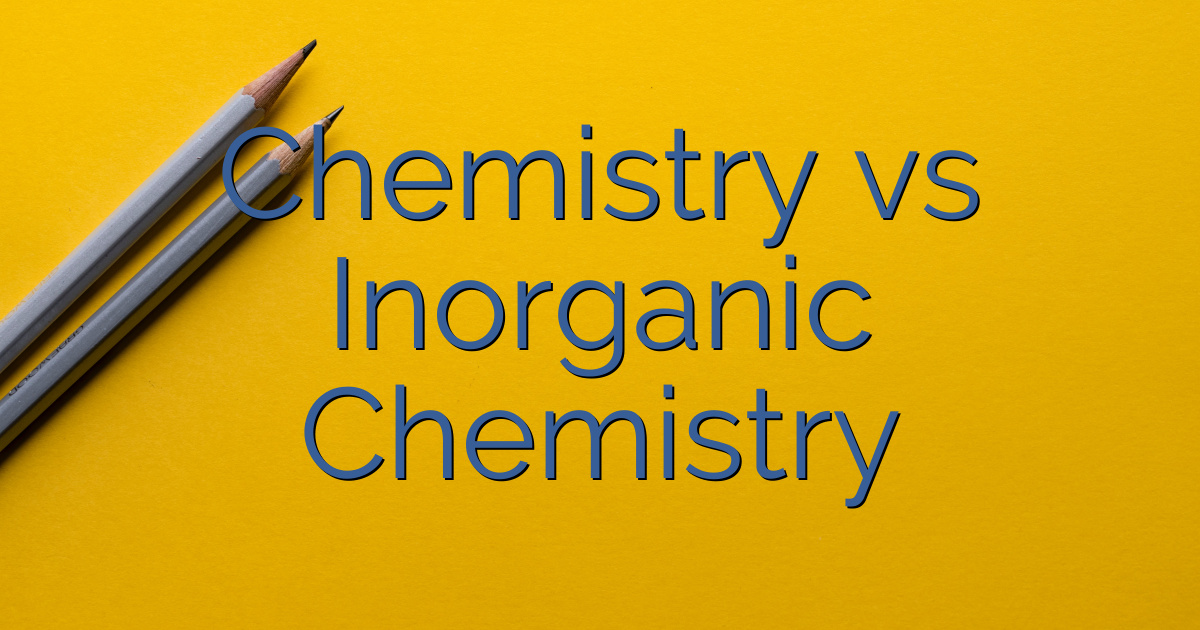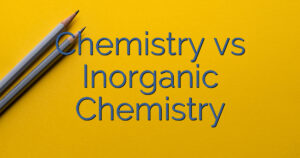 So, you think you know everything there is to know about chemistry? Well, prepare to have your knowledge challenged as we dive into the world of Chemistry vs. Inorganic Chemistry.
In this article, we will examine the differences and similarities between these two chemistry majors. From the curriculum to the career opportunities, we’ll explore it all.
Get ready for a data-driven, evidence-based exploration of the fascinating world of chemistry. Trust us, you won’t want to miss it.
So, you think you know everything there is to know about chemistry? Well, prepare to have your knowledge challenged as we dive into the world of Chemistry vs. Inorganic Chemistry.
In this article, we will examine the differences and similarities between these two chemistry majors. From the curriculum to the career opportunities, we’ll explore it all.
Get ready for a data-driven, evidence-based exploration of the fascinating world of chemistry. Trust us, you won’t want to miss it.
Table of Contents
Key Takeaways – Chemistry vs Inorganic Chemistry
- Chemistry curriculum covers organic chemistry, physical chemistry, and analytical chemistry, while Inorganic Chemistry curriculum focuses on inorganic compounds and includes coordination chemistry and solid-state chemistry.
- Chemistry graduates can pursue careers in pharmaceuticals, materials science, and environmental science, while Inorganic Chemistry specialization offers opportunities in catalysis, nanotechnology, and energy storage.
- Organic Chemistry focuses on carbon compounds, their structure, properties, reactions, and synthesis, while Inorganic Chemistry explores the properties and behavior of inorganic compounds, such as metals and minerals.
- Both majors provide a strong foundation in chemistry principles, laboratory techniques, and analytical methods.
Overview of the two chemistry majors
In choosing between chemistry and inorganic chemistry as your major, you’ll want to start with an overview of the two options. Let’s compare their curriculums and job prospects. Curriculum Comparison:- Chemistry: The curriculum covers a broad range of topics, including organic chemistry, physical chemistry, and analytical chemistry. You’ll learn about the properties, composition, and behavior of different substances, as well as chemical reactions and their applications.
- Inorganic Chemistry: This major focuses specifically on inorganic compounds and their properties. You’ll study topics like coordination chemistry, solid-state chemistry, and organometallic chemistry. Inorganic chemists work with elements on the periodic table, exploring their reactivity and applications.
- Chemistry: Graduates with a chemistry degree can pursue careers in various industries, such as pharmaceuticals, materials science, and environmental science. Job roles may include research chemist, quality control analyst, or forensic scientist.
- Inorganic Chemistry: With a specialization in inorganic chemistry, you can find opportunities in fields like catalysis, nanotechnology, and energy storage. You may work as a research scientist in academia, government labs, or industrial R&D.
Overview of the curriculum of the two chemistry majors: Organic and Inorganic Chemistry
Take a look at the curriculum for the two majors: Organic and Inorganic Chemistry. These majors offer different specialization options for aspiring chemists. Organic Chemistry focuses on the study of carbon compounds, including their structure, properties, reactions, and synthesis. The curriculum typically includes courses such as Organic Chemistry I and II, Physical Organic Chemistry, and Spectroscopy. In contrast, Inorganic Chemistry explores the properties and behavior of inorganic compounds, such as metals and minerals. The curriculum usually includes courses like Inorganic Chemistry I and II, Coordination Chemistry, and Solid State Chemistry. Both majors provide a strong foundation in chemistry principles, laboratory techniques, and analytical methods. However, Organic Chemistry delves deeper into carbon-based compounds, while Inorganic Chemistry explores the broader field of inorganic compounds.Overview of coursework and assessments in Inorganic Chemistry
Explore the variety of coursework and assessments you’ll encounter in the field of Inorganic Chemistry. In this discipline, coursework content focuses on understanding the properties, structure, and reactivity of inorganic compounds. You’ll delve into topics such as crystallography, coordination chemistry, and spectroscopy. Assessment methods include both theoretical and practical evaluations, allowing you to demonstrate your knowledge and skills. Here are some key assessment methods you may encounter:- Examinations: Assess your understanding of concepts, principles, and theories in inorganic chemistry.
- Laboratory experiments: Evaluate your ability to perform and analyze experiments, interpret data, and draw conclusions.
- Research projects: Provide an opportunity to explore a specific area of inorganic chemistry in-depth and showcase your research skills.
- Group presentations: Enhance your communication and teamwork skills while discussing and presenting scientific findings.
Comparison of Skills Developed: Analytical Techniques
By engaging in these assessment methods, you’ll develop analytical techniques that are essential for understanding the properties and reactivity of inorganic compounds. Inorganic chemistry relies heavily on precise and technical language to communicate ideas and findings accurately. Through a logical and systematic approach, chemical scientists present their experiments and results in a structured and organized manner, ensuring a clear flow of information. Analytical techniques in chemistry play a crucial role in comparing laboratory skills in different areas of study. These techniques involve the use of data and evidence to support statements and conclusions. Chemical scientists emphasize the importance of objective evidence and scientific rigor, relying on experimental results, numerical data, and scientific references. Through these methods, a comprehensive comparison of laboratory skills can be achieved, providing valuable insights into the field of inorganic chemistry.Comparison of Career Opportunities and Job Roles: Industry
Engaging in industry-related roles offers a wide range of career opportunities that allow professionals to apply their skills in practical settings. Here are four reasons why pursuing a career in the industry can lead to significant career growth and meet the demands of the market:- Diverse job roles: In the industry, you can work as a process chemist, quality control analyst, formulation scientist, or research and development chemist. These roles provide a variety of responsibilities and challenges, ensuring continuous growth and development.
- Industry demand: With the increasing need for new products, materials, and technology, the industry has a high demand for skilled chemists. This demand ensures job stability and opens up a multitude of opportunities for career advancement.
- Collaborative environment: Working in the industry often involves collaborating with multidisciplinary teams, including engineers, researchers, and business professionals. This collaborative environment fosters learning, innovation, and professional networking.
- Real-world impact: The work done in the industry directly impacts society by developing new drugs, improving manufacturing processes, and creating sustainable solutions. Contributing to real-world problems can provide a sense of purpose and fulfillment in your career.
Comparison of Salary Potential: Job Market
Consider the salary potential in the chemistry job market when deciding which career path to pursue. As a chemical scientist or research chemist, you understand the importance of precise and technical language in your writing. You communicate your ideas and findings using accurate and scientific terminology related to chemistry and inorganic chemistry. A logical and systematic approach is crucial in your writing. You present your ideas, experiments, and results in a structured and organized way, following a clear and coherent flow of information. You use headings, subheadings, and bullet points to present your work in a structured format. Your writing is data-driven and evidence-based, relying on experimental results, numerical data, and scientific references to support your statements, conclusions, and arguments. In the chemistry job market, it is essential to compare the salary potential to make an informed decision about your career path.Similarities between the two chemistry majors: Organic and Inorganic
When deciding between a career in organic or inorganic chemistry, it’s important to note the similarities between the two majors. While there are certainly differences, such as the focus on carbon-based compounds in organic chemistry and the study of non-carbon compounds in inorganic chemistry, there are also many areas where the two fields overlap. Here is a table outlining some of the key similarities between organic and inorganic chemistry:| Organic Chemistry | Inorganic Chemistry |
|---|---|
| Study of carbon-based compounds | Study of non-carbon compounds |
| Emphasis on reactions involving carbon | Focus on reactions involving nonmetals and metals |
| Analysis of organic compounds through spectroscopy | Analysis of inorganic compounds through various techniques |
| Development of synthetic routes for organic compounds | Synthesis and characterization of inorganic compounds |
| Investigation of structure, bonding, and reactivity of organic compounds | Exploration of structure, bonding, and reactivity of inorganic compounds |
Difference between the two chemistry majors: Organic and Inorganic
To understand the difference between the two chemistry majors, you’ll need to compare the focus and areas of study in organic and inorganic chemistry. Organic chemistry primarily deals with the study of carbon-based compounds and their reactions, while inorganic chemistry focuses on elements and compounds that do not contain carbon. Inorganic chemists study the properties and behavior of metals, minerals, and non-metallic elements. They explore topics such as coordination chemistry, solid-state chemistry, and bioinorganic chemistry. On the other hand, organic chemists investigate the synthesis, structure, and properties of organic compounds, including those found in living organisms. Both fields have their applications in everyday life. Organic chemistry contributes to the development of pharmaceutical drugs, polymers, and materials, while inorganic chemistry plays a crucial role in fields like catalysis, materials science, and environmental chemistry.Factors to consider when choosing between the two chemistry majors: Organic and Inorganic
When deciding between organic and inorganic chemistry as potential majors, there are several factors to consider. One important factor is the career prospects in each field. Organic chemistry is primarily focused on the study of carbon-based compounds, which are abundant in living organisms and have applications in pharmaceuticals, polymers, and materials science. On the other hand, inorganic chemistry deals with the properties and behavior of inorganic compounds, including metals and minerals, which find applications in fields such as catalysis, energy storage, and environmental remediation. To help you visualize the career prospects in these two chemistry majors, here is a table highlighting some key industries and areas where each field is relevant:| Organic Chemistry | Inorganic Chemistry |
|---|---|
| Pharmaceuticals | Catalysis |
| Polymers | Energy Storage |
| Materials Science | Environmental Remediation |
What are the differences between inorganic and organic chemistry?
In the field of chemistry, differences between inorganic and organic chemistry lay in their study of different compounds. Inorganic chemistry focuses on non-carbon compounds, while organic chemistry focuses on carbon-based compounds. This leads to distinct areas of study and research within the broader field of chemistry.

